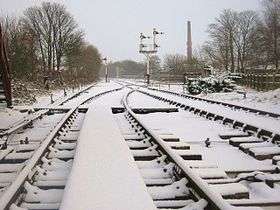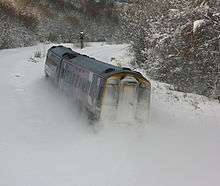The wrong type of snow

The wrong type of snow is a phrase coined by the British media in 1991 after severe weather caused disruption to many of British Rail's services. A British Rail press release implied that management and its engineering staff were unaware of different types of snow. Henceforth in the United Kingdom, the phrase became a byword for euphemistic and pointless excuses.[1]
Background
The phrase originated in a comment by British Rail's Director of Operations Terry Worrall on 11 February 1991 whilst being interviewed by James Naughtie. He explained that "we are having particular problems with the type of snow, which is rare in the UK". Naughtie replied "Oh, I see, it was the wrong kind of snow," to which Worrall replied, "No, it was a different kind of snow". The exchange prompted a headline in the London Evening Standard saying "British Rail blames the wrong type of snow" which was swiftly taken up by the media and other papers.[2] The cold snap had been forecast and British Rail had claimed to be ready for the coming snow. However, the snow – which was not deep enough for snowploughs or snow blowers to be effective – was unusually soft and powdery,[3] finding its way into electrical systems and causing short circuits and traction motor damage. For traction motors with integral cooling fans and air intakes pointing downwards – the type that is still common on British electric multiple units – the problem was made worse as the air intakes sucked up the loose snow. Meanwhile, the snow also became packed into sliding door mechanisms and into points, causing them to fail.[3] In addition, low temperatures resulted in problems with electric current collection from the third rail.
Many electric services had to be replaced by diesel haulage, and emergency timetables were introduced. Long delays were commonplace – up to eight hours in some cases. The disruption lasted over a week.[3]
Usage

The phrase "the wrong type of snow", "the wrong kind of snow" and variants appear periodically in British media reports concerning railway incidents brought on by adverse weather, with an intended polemic effect of instilling disbelief in the reader. The phrase "wrong kind of" had been used earlier when the rail authorities explained that a train had been unable to get up a hill when the 'wrong kind of grease' had been applied to the tracks. During the December 2009 European snowfall, several Eurostar trains broke down in the Channel Tunnel, trapping 2,000 passengers in the dark; newspapers reported "wrong type of fluffy snow".[4]
Following the destruction of the coastal railway line at Dawlish, Devon during severe weather in 2014, the Daily Telegraph carried a cartoon by Matt with a notice reading, "Trains cancelled - Wrong sort of seaweed".[5]
On 12 January 2016, The Guardian reported on Southeastern train delays caused by “strong sunlight” and the low winter sun with the headline, "Wrong kind of sunlight delays Southeastern trains in London".[6]
The Wrong Kind of Snow - The Complete Daily Companion to the British Weather is the title of a book written by Anthony Woodward and Robert Penn.
See also
| Wikimedia Commons has media related to Trains in snow in the United Kingdom. |
References
- Allan, Ian. Motive Power Monthly (May 1991) ISSN 0952-2867
- Hartley, Peter; Bruckmann, Clive G. (2002). Business Communication. Routledge. ISBN 0-415-19550-0.
- Gourvish, Terence (2002). British Rail, 1974-97: From Integration to Privatisation. ISBN 0-19-926909-2.
Notes
- ↑ Hartley & Bruckmann 2002, p. 1.
- ↑ Woodward, Antony and Penn, Robert (2008). The Wrong Kind of Snow: The Complete Daily Companion to the British Weather. London: Hodder & Stoughton. ISBN 978-0-340-93787-7
- 1 2 3 Gourvish 2002, p. 274.
- ↑ Bird, Steve; Lindsay, Robert (21 December 2009). "Eurostar blames 'fluffy' snow for weekend chaos". London: The Times. Retrieved 21 December 2009.
- ↑ Daily Telegraph, 6 February 2014,
- ↑ "Wrong kind of sunlight delays Southeastern trains in London". The Guardian. 12 January 2016. Retrieved 12 January 2016.